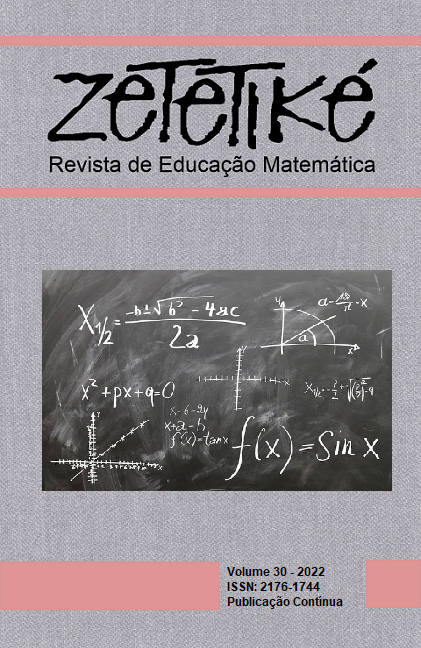Abstract
The work focuses on the approach to non-negative rational numbers explored in official curriculum documents and textbooks for the initial training courses of primary school teachers. The analysis was centered in the curricula of those courses, the primary education curricula and four manuals by reference authors in teacher training in Portugal, at the time. A document analysis was carried out, with a historical perspective. The first approach and definition of rational numbers is done through the measurement of quantities, but, implicitly, the manuals also present different meanings for fractions in context. In the manuals the importance given to the different representations is highlighted, for the presentation of the definition of rational number and in two of these manuals the importance given to the different contexts for the fractions is highlighted. The analysed manuals follow the instructions of the official documents, in the proposed approach to rational numbers. However, it is also possible to observe some autonomy of the authors of the manuals in relation to the official curricular documents.
References
Baptista, M. (2004). O Ensino Normal Primário. Currículo, práticas e políticas de educação. Lisboa: Educa.
Behr, M., Harel, G., Post, T., & Lesh, R. (1992). Rational number, ratio and proportion. In D. Grouws (Org.), Handbook of research on mathematics teaching and learning (pp. 296-333). NY: Macmillan.
Chervel, A. (1990). História das disciplinas escolares: reflexões sobre um campo de pesquisa. Teoria & Educação, 2, 177-229.
Correia, A., & Silva, V. (2002). Manuais pedagógicos – Portugal e Brasil – 1930 a 1971: produção e circulação internacional de saberes pedagógicos. Lisboa: Educa.
Decreto n.º 16.730. Diário do Governo, 83, (13/04/1929), 896-908.
Decreto n.º 18.646. Diário do Governo, 166, (19/07/1930), 1443-50.
Decreto n.º 27.603. Diário do Governo, 72, (29/03/1937), 286-90.
Decreto n.º 25.311. Diário do Governo, 106, (10/05/1935), 636-44.
Decreto n.º 32.269. Diário do Governo, 12, (16/01/1943), 31-41.
Decreto-lei n.º 42.994, Diário do Governo, 125, (28/05/1960), 2165-207.
Decreto-lei n.º 43.369. Diário do Governo, 279, (02/12/1960), 2674-6.
Gaspar, J. & Ferreira, O. (1944). Notas de Didáctica Especial. Lisboa: B.U. Amaral.
Gonçalves, G. (1972). Didáctica do cálculo (apontamentos), 1.º volume. 2.ª ed. Porto: Porto Editora
Gonçalves, G. (1974). Didáctica do cálculo (apontamentos), 2.º volume. 2.ª ed. Porto: Porto Editora.
Kieren, T. (1976). On the mathematical, cognitive, and instructional foundations of rational numbers. In R. Lesh (Ed.), Number and Measurement: Papers from a Research Workshop (pp. 101-144). Columbus, OH: ERIC/SMEAC.
Kieren, T. (1988). Personal knowledge of rationals numbers: its intuitive and formal development. In J. Hilbert & M. Behr (Org.), Number concepts and operations in the middle grades VII (pp. 162-181). Reston, VA: NCTM & Hillsdale, NJ: Lawrence Erbaulm.
Klein, F. (2009). Matemática elementar de um ponto de vista superior: volume 1 – 1.ª parte - Aritmética. Lisboa: SPM.
Matos, J. (2018). Revisitando a história da educação matemática: fundamentos, metodologias e temáticas. In Rodrigues, A., Barbosa, A., Santiago, A., Domingos, A., Carvalho, C., Ventura, C., … Carreira, S. (Eds.). Livro de atas do Encontro de Investigação em Educação. Coimbra: ESE-IPC.
Monteiro, C., & Pinto, H. (2005). A aprendizagem dos números racionais. Quadrante, Revista de Investigação em Educação Matemática, 14, 89-107. Lisboa: Associação de Professores de Matemática.
Ni, Y., & Zhou, Y. (2005) Teaching and learning fraction and rational numbers: The Origins and implications of whole number bias. Educational Psychologist, 40(1), 27-52, doi:10.1207/s15326985ep4001_3
Nunes, T., Bryant, P. & Watson, A. (2009). Keys understandings in mathematics learning. Retirado em 20 de novembro de 2011, de http://www.nuffieldfoundation.org/sites/default/files/MATHS_COMBINEDv_FINAL(1).pdf
Pimentel Filho, A. (1934). Súmula didáctica. Lisboa: Livraria Editora.
Pinheiro, J. (1961). Introdução ao estudo da didáctica especial. Lisboa: Escola do Magistério Primário de Lisboa.
Pintassilgo, J. (2006). Os manuais de pedagogia no primeiro terço do século XX: entre a tradição e a inovação. In J. Pintassilgo, M. Freitas, M. Mogarro, & M. Carvalho (Orgs.), História da escola em Portugal e no Brasil: circulação e apropriação de modelos culturais, 175-200. Lisboa: Edições Colibri.
Pinto, H. (2011). O desenvolvimento do sentido da multiplicação e da divisão de números racionais. Tese de doutoramento: Universidade de Lisboa.
Portaria n.º 23.485. Diário do Governo, 167, 16/07/1968, 1019-36.
Silva, V. (2001). História de leituras para professores: um estudo da produção e circulação de saberes especializados nos “manuais pedagógicos” brasileiros (1930-1971) (2 vols.). Dissertação de mestrado, Faculdade de Educação da Universidade de São Paulo, São Paulo, Brasil.
Valente, W. (2007). História da educação matemática: interrogações metodológicas. Revista eletrônica de educação matemática. v2(2), 28-49.
Valente, W. (2019). Saber objetivado e formação de professores: reflexões pedagógico-epistemológicas. Revista História da Educação (Online), 23, 1-22, DOI: http://dx.doi.org/10.1590/2236-3459/77747

This work is licensed under a Creative Commons Attribution-NonCommercial-NoDerivatives 4.0 International License.
Copyright (c) 2022 Zetetiké


